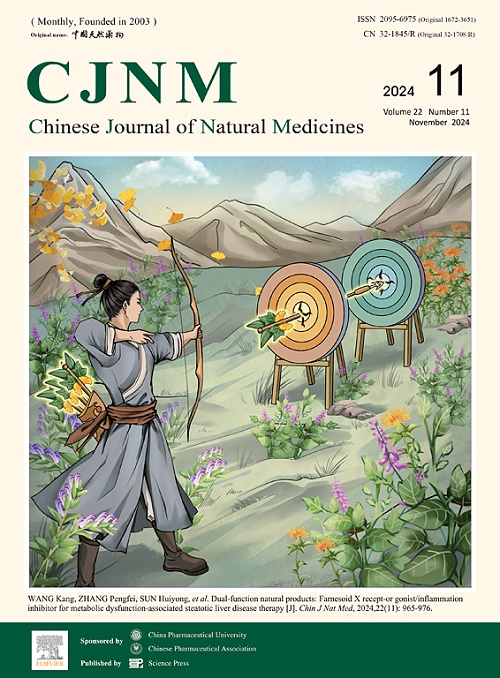中医药治疗牙周炎的前景及作用机制
IF 4.9
2区 医学
Q1 INTEGRATIVE & COMPLEMENTARY MEDICINE
引用次数: 0
摘要
炎症是组织损伤后由细胞活动和炎症介质引发的一种重要的免疫反应。它在多种疾病的病理进展中起着核心作用,包括精神疾病、癌症和免疫疾病,使其成为治疗干预的重要目标。牙周炎是一种常见的口腔炎症性疾病,是牙齿脱落的主要原因,在全球范围内构成重大健康挑战。传统上,诸如牙周炎之类的炎症性疾病是通过全身注射合成化学物质来治疗的。然而,近年来出现了挑战,包括与这些治疗相关的耐药性和微生物生态失调。相比之下,来自中药的天然产品具有许多优点,如安全性高,副作用小,药理机制创新,易于提取,靶点多,使其成为治疗炎症的传统抗生素的可行替代品。许多有效的抗炎天然产物已经在中医(TCM)中被发现,包括生物碱、类黄酮、萜类、木脂素和其他天然产物,它们对炎症有抑制作用,是潜在的治疗药物。几项研究证实了这些化合物的实质性抗炎和免疫调节特性。本文综合检索了PubMed、Web of Science和CNKI等数据库中有关中药衍生天然产物抗炎作用的文献,重点研究了“炎症”、“牙周炎”、“药理学”和“中医”等术语。本文系统总结了这些化合物在炎症反应中的分子药理学、化学成分、生物活性及其作用机制。本研究旨在加深对草药提取物治疗炎症性疾病的机制和生物活性的理解,可能导致有希望的新型抗炎药物的开发。未来的应用可能会扩展到各种炎症的治疗,包括牙周炎。本文章由计算机程序翻译,如有差异,请以英文原文为准。
The prospect and underlying mechanisms of Chinese medicine in treating periodontitis
Inflammation represents a critical immune response triggered by cellular activities and inflammatory mediators following tissue damage. It plays a central role in the pathological progression of diverse diseases, including psychiatric disorders, cancer, and immunological conditions, rendering it an essential target for therapeutic intervention. Periodontitis, a prevalent oral inflammatory disease, is a leading cause of tooth loss and poses significant health challenges globally. Traditionally, inflammatory diseases such as periodontitis have been treated with systemic administration of synthetic chemicals. However, recent years have witnessed challenges, including drug resistance and microbial dysbiosis associated with these treatments. In contrast, natural products derived from Chinese medicine offer numerous benefits, such as high safety profiles, minimal side effects, innovative pharmacological mechanisms, ease of extraction, and multiple targets, rendering them viable alternatives to conventional antibiotics for treating inflammatory conditions. Numerous effective anti-inflammatory natural products have been identified in traditional Chinese medicine (TCM), including alkaloids, flavonoids, terpenoids, lignans, and other natural products that exhibit inhibitory effects on inflammation and are potential therapeutic agents. Several studies have confirmed the substantial anti-inflammatory and immunomodulatory properties of these compounds. This comprehensive review examines the literature on the anti-inflammatory effects of TCM-derived natural products from databases such as PubMed, Web of Science, and CNKI, focusing on terms like “inflammation”, “periodontitis”, “pharmacology”, and “traditional Chinese medicine”. The analysis systematically summarizes the molecular pharmacology, chemical composition, and biological activities of these compounds in inflammatory responses, alongside their mechanisms of action. This research seeks to deepen understanding of the mechanisms and biological activities of herbal extracts in managing inflammatory diseases, potentially leading to the development of promising new anti-inflammatory drug candidates. Future applications could extend to the treatment of various inflammatory conditions, including periodontitis.
求助全文
通过发布文献求助,成功后即可免费获取论文全文。
去求助
来源期刊

Chinese Journal of Natural Medicines
INTEGRATIVE & COMPLEMENTARY MEDICINE-PHARMACOLOGY & PHARMACY
CiteScore
7.50
自引率
4.30%
发文量
2235
期刊介绍:
The Chinese Journal of Natural Medicines (CJNM), founded and sponsored in May 2003 by China Pharmaceutical University and the Chinese Pharmaceutical Association, is devoted to communication among pharmaceutical and medical scientists interested in the advancement of Traditional Chinese Medicines (TCM). CJNM publishes articles relating to a broad spectrum of bioactive natural products, leading compounds and medicines derived from Traditional Chinese Medicines (TCM).
Topics covered by the journal are: Resources of Traditional Chinese Medicines; Interaction and complexity of prescription; Natural Products Chemistry (including structure modification, semi-and total synthesis, bio-transformation); Pharmacology of natural products and prescription (including pharmacokinetics and toxicology); Pharmaceutics and Analytical Methods of natural products.
 求助内容:
求助内容: 应助结果提醒方式:
应助结果提醒方式:


